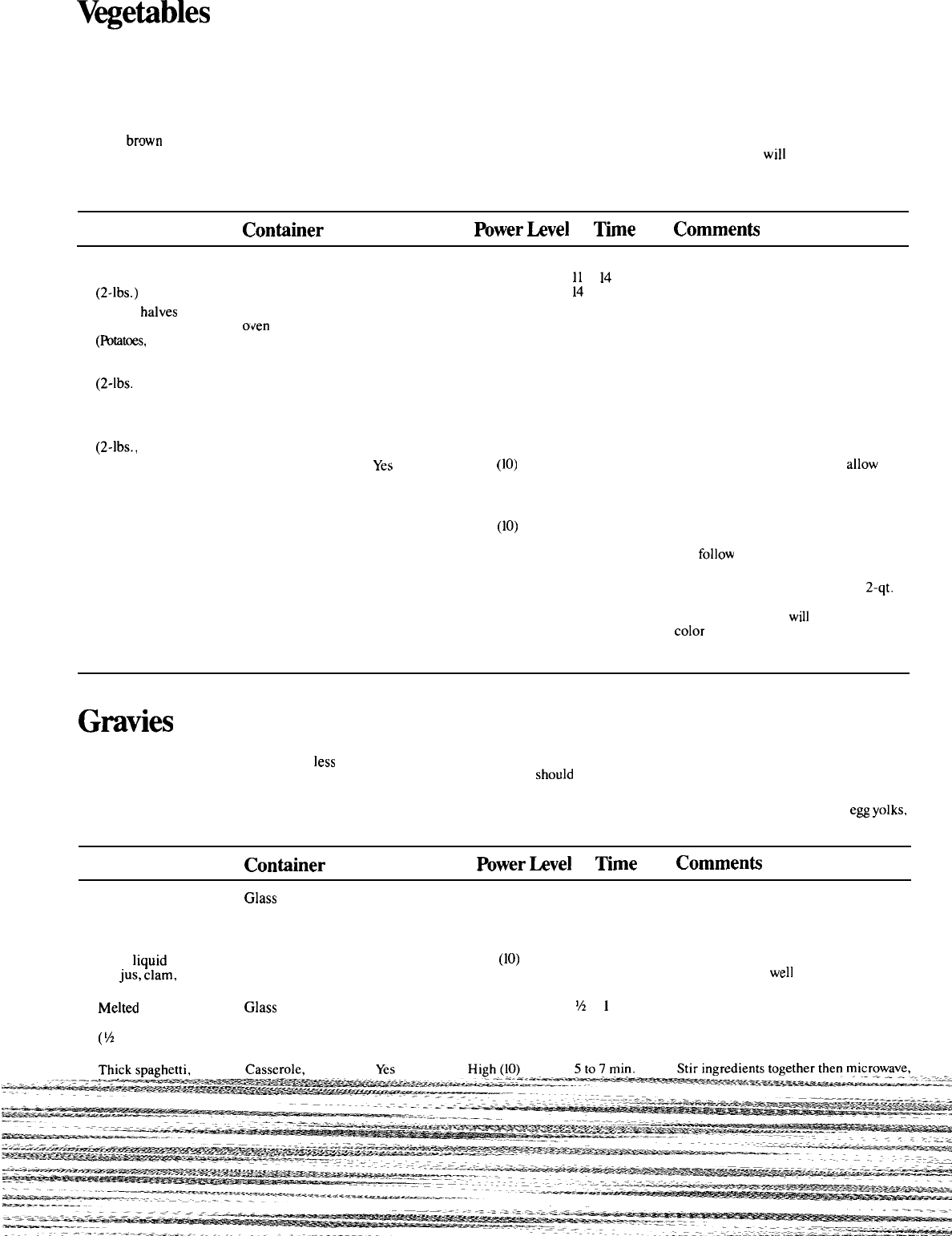
Vqetibles
1.
Always use microwave safe cookware, glass or plastic. Cook
4.
most vegetables with tight cover to steam them. Exceptions are
potatoes cooked in their skins and watery vegetables which need
5.
no water added for steam.
2. Do not salt tops of vegetables before
microwaving. If desired, add
salt to water in dish before adding vegetables. Salt can sometimes
cause
brown
spots on vegetables during microwaving.
3. Cooking time
for vegetables affects finished taste and texture.
Minimum time on guide gives fresh taste and crisp-tender texture.
For soft texture with well-developed flavor, cook maximum time
or longer.
Size of pieces affects cooking time. Large pieces generally take
longer than small uniform pieces.
Just as when cooking conventionally, vegetable mixtures should
have similar densities or degrees of firmness in order to cook
together successfully. Firm, crisp vegetables like carrots,
cauliflower and broccoli microwave together well. If microwaving
a firm vegetable with a soft one (carrots and peas, for example)
cut the carrots in julienne strips so they
will
cook as fast as the
peas. Or, start cooking larger carrot pieces first, and add peas
during last few minutes.
Vegetables
Conhiner
Cover
hwer
hvel
&
~me
Commenk
Slices, pieces
(l-lb.)
(2-lbs.)
Whole,
halves
or large,
starchy vegetables
(Wtatoes,
winter squash,
cauliflower, etc. )
(l-lb., 3 to 4)
(2-lbs.
,6 to 8)
Watery (Tomatoes,
summer squash)
(l-lb., 3 to 4)
(2-lbs.,
6 to 8)
Vegetable Casseroles
(With raw vegetables)
(With precooked
vegetables)
Stir-Fry Vegetables
(6 to 8 servings)
Blanching fresh
vegetables for
freezing
Casserole
Potatoes: Cook on
oren floor (no
container) Other
vegetables: Square
or oblong dish
or casserole
Glass
casserole
Yes
High (10)
Potatoes: No High (10)
Winter
squash,
cauliflower,
etc.: Yes
Yes
High (10)
Yes
Yes
Yes
High
(10)
High
(10)
High (10)
11
to
14
min.
14
to 18 min.
Add 1/4 to 1/2 cup water. If frozen,
reduce time 3 to 5 minutes because
vegetables are blanched.
Prick skin of potatoes before cooking.
12 to 20 min.
16 to 20 min.
Cut in pieces or halves. No additional
water needed.
4 to 5 min.
6 to 8 min.
18 to 20 min.
10 to 12 min.
10 to 12 min.
3 to 5 min.
Use large enough casserole to
allow
for
boiling in dish.
To stir-fry one type of vegetable,
substitute 1 tablespoon oil for water
and
follow
times in cooking guide.
Blanch only 1 pound or 1 quart prepared
vegetables at a time. Place in 1 to
2-qt.
casserole with 1/4 to 1/2 cup water.
Blanched vegetables
will
have bright, even
color
and will be slightly softened. Cool
drained blanched vegetables immediately
by plunging in container of ice water.
Gmvies
& Sauces
1. Because microwaved sauces evaporate less than on the range top,
2. Microwaved sauces do not need to be stirred constantly but most
they are thinner than conventionally cooked sauces made with the
should be whisked vigorously with wire whisk once or twice
same amount of thickening. Increase thickening by adding an
while microwaving.
extra teaspoon to 1 tablespoon flour or cornstarch for each cup
3. Vary basic white sauce (see page 23) by adding cheese,
e=
yolks,
of liquid.
cream or dry milk solids. Add flour with mayonnaise or wine.
Food
Contiiner
Cover
%wer
hvel
&
~me
Commenk
Gravies and sauces
Glass measure
No
High (10)
4 to 5 min.
Microwave fat, flour and salt together
thickened with flour
or bowl
to melt and blend. Whisk in liquid and
or cornstarch (1 cup)
finish. Increase time 1 to 2 minutes per
additional cup of sauce.
Thin,
liquid
sauces
Casserole
No
High
(10)
2 to 3 min.
Add cornstarch-water mixture to heated
(au jus, clam, etc.)
(1 cup)
ingredients. Stir
well
and microwave to
finish.
Melted
butter sauces,
Glass measure
No
High (10)
1/2
to
1
min.
Microwave butter just to melt. For
clarified butter
(%
cup)
clarified butter, bring to boil then let
stand until layers separate. Pour off
and use clear top layer.


















